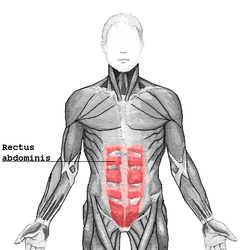Rectus sheath hematoma

Editor-In-Chief: Prab R Tumpati, MD
Obesity, Sleep & Internal medicine
Founder, WikiMD Wellnesspedia &
W8MD's medical weight loss NYC, sleep center NYC
Philadelphia medical weight loss and Philadelphia sleep clinics
| Rectus sheath hematoma | |
|---|---|

| |
| Synonyms | Hematoma of the rectus sheath |
| Pronounce | N/A |
| Specialty | General surgery, Emergency medicine |
| Symptoms | Abdominal pain, palpable abdominal mass, bruising |
| Complications | Hypovolemic shock, abdominal compartment syndrome |
| Onset | Sudden |
| Duration | Varies |
| Types | N/A |
| Causes | Trauma, anticoagulation, coughing, pregnancy |
| Risks | Anticoagulant therapy, older age, female gender |
| Diagnosis | Ultrasound, CT scan |
| Differential diagnosis | Appendicitis, ovarian torsion, abdominal aortic aneurysm |
| Prevention | N/A |
| Treatment | Conservative management, surgery if severe |
| Medication | N/A |
| Prognosis | Generally good with treatment |
| Frequency | Rare |
| Deaths | N/A |


File:UOTW 13 - Ultrasound of the Week 1.webm Rectus Sheath Hematoma (RSH) is a rare, often misdiagnosed condition that involves the accumulation of blood within the Rectus sheath, the fibrous layer of connective tissue that encloses the Rectus abdominis muscle. This condition is typically caused by damage to the Superior epigastric artery or Inferior epigastric artery, which supply blood to the rectus abdominis muscle.
Etiology[edit]
The most common causes of Rectus Sheath Hematoma are trauma, anticoagulation therapy, and strenuous physical activity. Other factors that may contribute to the development of this condition include pregnancy, surgery, and certain medical procedures such as coughing, Valsalva maneuver, and Colonoscopy.
Clinical Presentation[edit]
Patients with Rectus Sheath Hematoma typically present with sudden onset of abdominal pain, often accompanied by a palpable abdominal mass. Other symptoms may include nausea, vomiting, and signs of Hemodynamic instability such as tachycardia and hypotension.
Diagnosis[edit]
Diagnosis of Rectus Sheath Hematoma can be challenging due to its nonspecific clinical presentation. It is often misdiagnosed as other conditions such as acute Appendicitis, Cholecystitis, or Diverticulitis. Diagnostic tools that can aid in the identification of this condition include Ultrasound, CT scan, and MRI.
Treatment[edit]
Treatment of Rectus Sheath Hematoma is largely dependent on the severity of the condition. Conservative management, including bed rest, analgesia, and cessation of anticoagulation therapy, is often sufficient for small hematomas. Larger hematomas may require surgical intervention, such as Embolization or Laparotomy.
Prognosis[edit]
The prognosis for Rectus Sheath Hematoma is generally good, especially when the condition is diagnosed and treated promptly. However, complications can occur, particularly in patients with large hematomas or underlying medical conditions.
Ad. Transform your life with W8MD's Budget GLP-1 injections from $75


W8MD offers a medical weight loss program to lose weight in Philadelphia. Our physician-supervised medical weight loss provides:
- Weight loss injections in NYC (generic and brand names):
- Zepbound / Mounjaro, Wegovy / Ozempic, Saxenda
- Most insurances accepted or discounted self-pay rates. We will obtain insurance prior authorizations if needed.
- Generic GLP1 weight loss injections from $75 for the starting dose.
- Also offer prescription weight loss medications including Phentermine, Qsymia, Diethylpropion, Contrave etc.
NYC weight loss doctor appointmentsNYC weight loss doctor appointments
Start your NYC weight loss journey today at our NYC medical weight loss and Philadelphia medical weight loss clinics.
- Call 718-946-5500 to lose weight in NYC or for medical weight loss in Philadelphia 215-676-2334.
- Tags:NYC medical weight loss, Philadelphia lose weight Zepbound NYC, Budget GLP1 weight loss injections, Wegovy Philadelphia, Wegovy NYC, Philadelphia medical weight loss, Brookly weight loss and Wegovy NYC
|
WikiMD's Wellness Encyclopedia |
| Let Food Be Thy Medicine Medicine Thy Food - Hippocrates |
Medical Disclaimer: WikiMD is not a substitute for professional medical advice. The information on WikiMD is provided as an information resource only, may be incorrect, outdated or misleading, and is not to be used or relied on for any diagnostic or treatment purposes. Please consult your health care provider before making any healthcare decisions or for guidance about a specific medical condition. WikiMD expressly disclaims responsibility, and shall have no liability, for any damages, loss, injury, or liability whatsoever suffered as a result of your reliance on the information contained in this site. By visiting this site you agree to the foregoing terms and conditions, which may from time to time be changed or supplemented by WikiMD. If you do not agree to the foregoing terms and conditions, you should not enter or use this site. See full disclaimer.
Credits:Most images are courtesy of Wikimedia commons, and templates, categories Wikipedia, licensed under CC BY SA or similar.
Translate this page: - East Asian
中文,
日本,
한국어,
South Asian
हिन्दी,
தமிழ்,
తెలుగు,
Urdu,
ಕನ್ನಡ,
Southeast Asian
Indonesian,
Vietnamese,
Thai,
မြန်မာဘာသာ,
বাংলা
European
español,
Deutsch,
français,
Greek,
português do Brasil,
polski,
română,
русский,
Nederlands,
norsk,
svenska,
suomi,
Italian
Middle Eastern & African
عربى,
Turkish,
Persian,
Hebrew,
Afrikaans,
isiZulu,
Kiswahili,
Other
Bulgarian,
Hungarian,
Czech,
Swedish,
മലയാളം,
मराठी,
ਪੰਜਾਬੀ,
ગુજરાતી,
Portuguese,
Ukrainian
